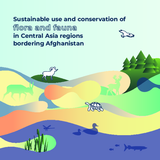
Good environmental governance

To strengthen environmental governance, the OSCE promotes the implementation of several multilateral environmental agreements, including through the operation of the Aarhus Centres network.
Quick links
Overview
Building trust and confidence to strengthen governance
Good environmental governance is essential to achieve sustainable development and to protect the environment. It is an important instrument to reduce tensions within and between countries on the use of natural resources, thus contributing to building trust and confidence at all levels and, as a consequence, strengthening security.
Our work
Our thematic and programmatic tasks
By promoting good environmental governance, the OSCE aims to support its participating States in strengthening national authorities and empowering civil society.

Good Environmental Governance
The OSCE commitments in the area of good environmental governance flow from the 1975 Helsinki Final Act and have been reiterated in the 2003 OSCE Strategy Document for the Economic and Environmental Dimension, which encouraged the participating States in undertaking action and policies aiming at strengthening good governance at all levels, ensuring sustainable development and protecting the environment. The relevance of good environmental governance has also been highlighted in a number of decisions, including the 2007 Madrid Declaration on Environment and Security and the 2014 Basel Ministerial Council Decision on Enhancing Disaster Risk Reduction.
Information and participation for environment and security: the Aarhus Centres
Since 2002, the OSCE has been promoting the establishment and functioning of Aarhus Centres, which facilitate the implementation of the Aarhus Convention by raising public awareness of environmental issues, facilitating access to information and justice in environmental matters, and enhancing public participation in decision-making processes.
The OSCE-supported network of Aarhus Centres is active in 15 countries in the OSCE area. Among other activities, the Aarhus Centres play a prominent role in enhancing green economy and resource-efficiency initiatives.
Support for the implementation of multilateral environmental agreements
The OSCE also provides support for the implementation of other multilateral environmental agreements, such as the Convention on the Protection and Use of Transboundary Watercourses and International Lakes (Water Convention), the Convention on Environmental Impact Assessment in a Transboundary Context (Espoo Convention) and its Protocol on Strategic Environmental Assessment (SEA). In particular, the OSCE provides support for legislative reform to align the existing national systems with the provisions of the Espoo Convention and the Protocol on SEA.
Building up good environmental governance requires close co-operation between international, regional and national bodies. For this reason, the OSCE implements its activities in co-ordination with several key stakeholders, other international and non-governmental organizations, governmental authorities, civil society and the business community.
Featured
Activities, news and other highlights
News and activities
Current announcements, press releases, media advisories and other updates
Resources
Official OSCE documents, publications and other manually selected resources
Studies and reports
Reports, studies and analyses for policymakers, researchers and all those interested in this field of our work
Manuals and guides
Practice-oriented manuals, guides, handbooks and recommendations for policymakers and practitioners working in this field









